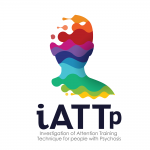gameChange: Immersive virtual reality to transform the lives of patients with mental health difficulties.
What is the study about?
gameChange is a large project, taking place over three years. The project is funded by The National Institute of Health Research (NIHR) invention 4 innovation (i4i) Mental Health 2017 Challenge Award. The study will look at the impact of virtual reality (VR) treatment on people with psychosis. The ultimate goal of this VR treatment is to help people to go out more and feel less anxious when doing so.
The project brings together a team of NHS Trusts, Universities, The Royal College of Art, mental health charity McPin Foundation (which places services users at the heart of its research), MindTech (who develop new technologies for the treatment, diagnosis and management of mental health), and Oxford VR – (The University of Oxford’s virtual reality spin-out company). The project will be led by Professor Daniel Freeman, from the University of Oxford’s Department of Psychiatry.
The gameChange project is comprised of four work packages:
- An initial design phase to program a VR treatment that is simple to use, engaging, and right for patient’s needs.
- Work with NHS staff to understand, and consider ways to overcome, the barriers and facilitators to delivering VR treatment within routine mental health services.
- A large multi-centre clinical trial in NHS trusts across the country to demonstrate the benefits of the VR treatment.
- Making a commissioning case to help roll out the treatment across the NHS (scheduled for June 2021).
Both service users and NHS staff will be involved in developing the VR treatment, and an implementation toolkit. Input from staff and patients has already begun, and will continue to play a significant role throughout the project.
Recruitment for a randomised control trial is set to begin in July 2019 across five sites: Manchester, Oxford, Nottingham, Newcastle and Bristol; recruiting 432 participants before the trial ends in June 2020. The inclusion criteria is intentionally broad to enable maximum treatment uptake. To be eligible, an individual will need to be attending psychosis services and have self-reported difficulties of going outside. As part of the trial, health economics data will be collected to demonstrate whether VR treatment is cost effective, and inform a commissioning case for NHS services, with an associated commercialisation strategy.
gameChange VR Treatment:
gameChange VR treatment is fully automated and based on CBT principles. With the help of a virtual coach, service users will enter virtual versions of everyday situations that they find difficult, and be encouraged to try techniques to help overcome their difficulties.
“When VR is done properly, the experience triggers the same psychological and physiological reactions as real-life situations. And that means that what people learn from the VR therapy can help them in the real world” – Oxford VR.
The VR treatment will consist of six 30 minute sessions. The number of sessions can be increased/decreased by two dependant on an individual’s needs. VR will be offered in addition to participant’s usual care.
VR technology has made great advancements in a short space of time. VR kits are readily available and inexpensive, meaning VR has the potential to be implemented across the NHS.




